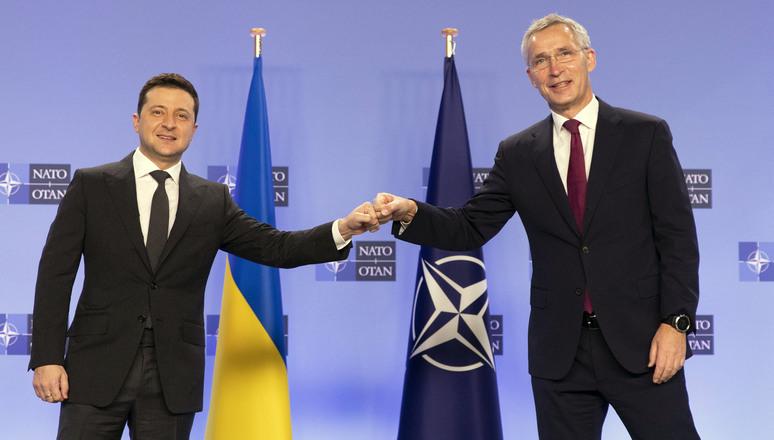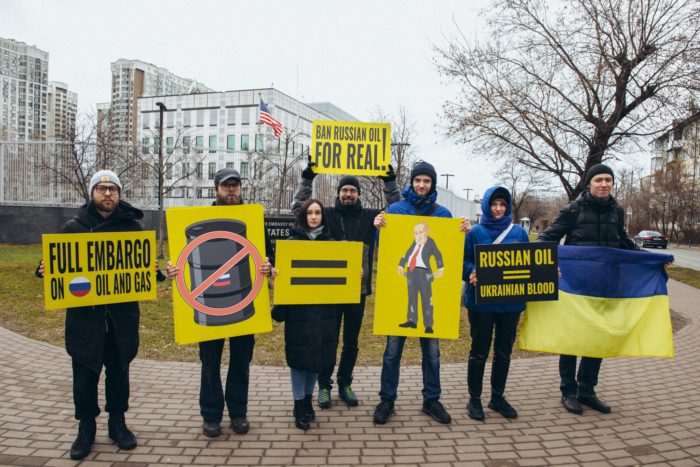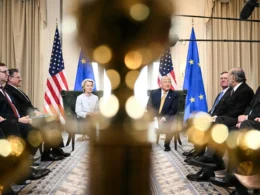North Atlantic nations face a major decision at next month’s summit in Lithuania. Multiple scenarios show that leaving Ukraine outside the organization will have severe repercussions for European security; welcoming Ukraine promises several benefits
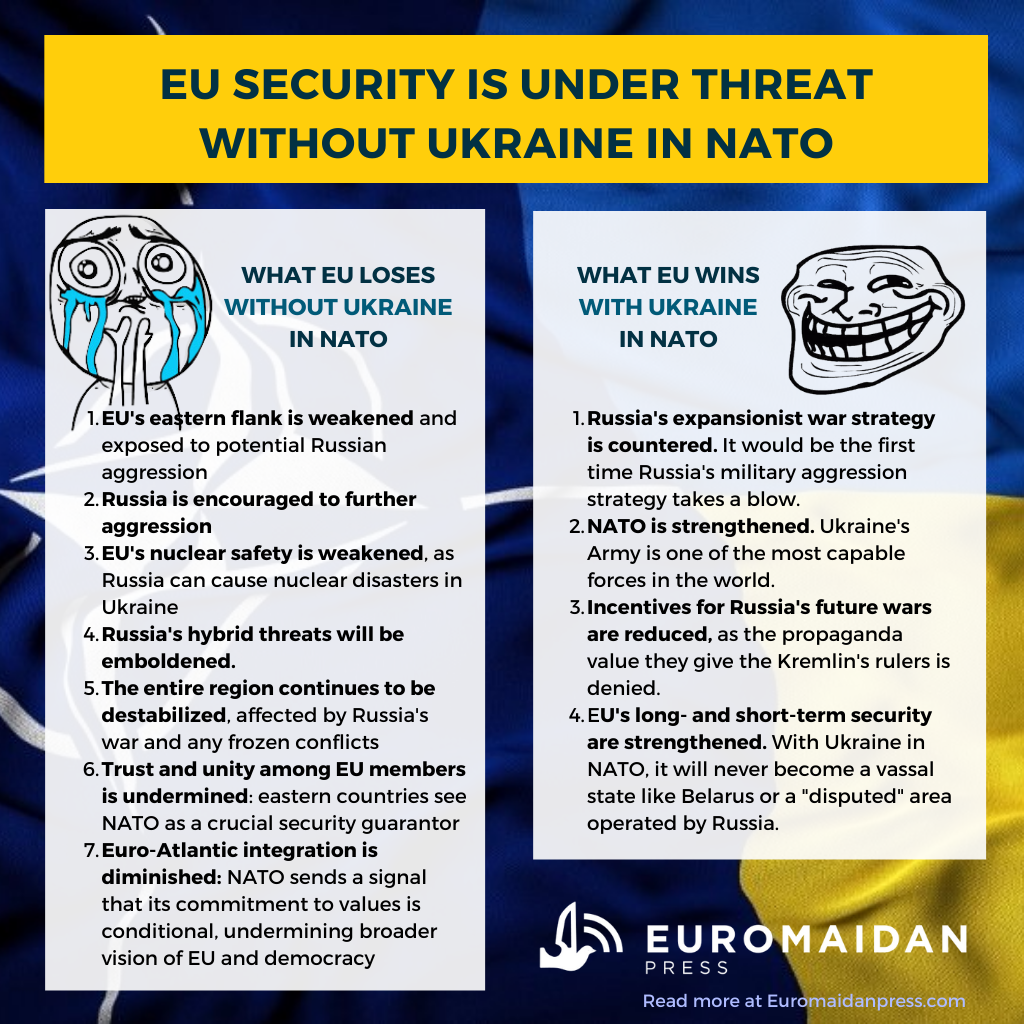
Excluding Ukraine from NATO: Implications for EU security
1. Weakening the Eastern Flank: Ukraine serves as a crucial buffer between NATO and Russia. By excluding Ukraine from NATO, the EU would leave its eastern flank vulnerable to potential Russian aggression. This would create a security gap in the region, allowing Russia to exert greater influence and potentially destabilize neighboring countries, thereby posing a direct threat to EU security.
2. Encouraging Further Russian Aggression: Not granting Ukraine NATO membership would signal to Russia that its aggressive actions, such as the annexation of Crimea and the on-going full-scale war, can be carried out without severe consequences. This lack of deterrence would embolden Russia to continue its expansionist policies, potentially targeting other countries in the region. The EU's failure to provide a unified and robust response would undermine the credibility of its security commitments.
3. Nuclear Safety and Security: Russia has shown a disregard for nuclear safety by using occupied nuclear power plants, including Chernobyl, as military bases. The Zaporizhzhia nuclear power plant has also been exploited as a launchpad for attacks on neighboring towns. By integrating Ukraine into NATO, the EU can enhance nuclear safety and prevent potential disasters that could affect both Ukraine and the eastern part of the EU.
4. Perpetuating Hybrid Threats: Russia has been using hybrid warfare tactics, including disinformation campaigns, cyberattacks, and covert operations, to undermine neighboring countries and sow divisions within the EU. By leaving Ukraine outside of NATO, the EU would leave a vulnerable partner exposed to these hybrid threats. The lack of collective defense mechanisms and intelligence sharing could lead to a weakened EU security posture overall.
5. Destabilizing the Region: Ukraine's security situation directly affects the stability of the broader Eastern European region. Leaving Ukraine out of NATO could result in a protracted conflict or the perpetuation of "frozen conflicts" within its borders. It would continue to pose risks, create instability, and potentially spill over into neighboring countries, exacerbating tensions and jeopardizing EU security as a whole.
6. Undermining Trust and Unity: Excluding Ukraine from NATO would undermine trust and unity among EU member states. Eastern EU countries view NATO as a crucial security guarantor and rely on its collective defense provisions to deter potential aggression. Failing to extend this security umbrella to Ukraine would strain relations within the EU and create divisions between member states, weakening the bloc's ability to address common security challenges effectively.
7. Diminishing Euro-Atlantic Integration: NATO membership is not just about security; it also represents a commitment to shared values, democratic principles, and Euro-Atlantic integration. By leaving Ukraine outside of NATO, the EU would be sending a message that its commitment to these values is conditional and that certain countries may not have the same pathway to integration. This could undermine the EU's broader vision of a Europe as whole, free, and at peace.
In conclusion, leaving Ukraine out of NATO would undermine EU security by weakening the eastern flank, encouraging further Russian aggression, perpetuating hybrid threats, destabilizing the region, undermining trust and unity among member states, and diminishing Euro-Atlantic integration. It is in the EU's best interest to recognize the importance of Ukraine's NATO membership in ensuring a secure and stable Europe.
Granting Ukraine NATO membership: benefits for EU security
Context
Russia has repeatedly demonstrated its willingness to use military force to achieve its objectives in non-NATO countries. Per Levada center, Vladimir Putin’s rating shows a significant boost every time he initiates a war. After Russia’s short war with Georgia in 2008, Putin’s approval rating shot up to 88%. In 2014, after the annexation of Crimea, the same thing happened: the proportion of people who said they approved of Putin's leadership once again rose to the same figure. The start of the full-scale war in February 2022 boosted his rating to 83%.
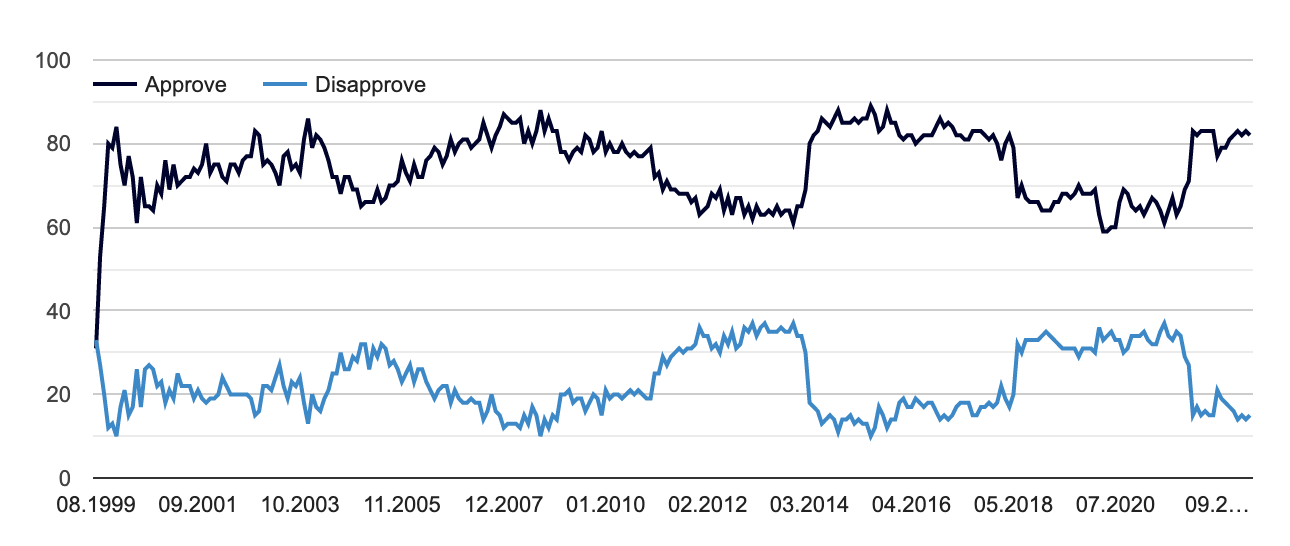
As of 2022, Belarus and Ukraine no longer serve as a "safety buffer" between the EU and Russia. Belarus has become a vassal state of Russia and is being used as a military base and launchpad for attacks on Ukraine. The war against Ukraine has far-reaching implications, and is already affecting territories close to EU borders.
Efforts by Russia to establish vassal states and "disputed territories" adjacent to the EU hold a great strategic significance. These regions can potentially serve as platforms for launching aggression against NATO countries, while Russia avoids direct confrontation with NATO forces. The recent Belarus-EU border crisis and a future potential migration crisis scheduled for July in the form of a visa-free Art Festival in Belarus, exemplifies just one variety of hybrid threat posed by Russia's vassal states and the potential risks they pose to EU security.
Additionally, Russia's objective includes weakening NATO and the EU. Strengthening parastatal states and operating "disputed" territories enables Russia to exert pressure on Euro-Atlantic structures. It is crucial for the EU to recognize and address these challenges to safeguard its security and peace.
Integrating Ukraine into NATO: benefits for EU security
1. Countering Russia's Strategy: Since 1992, Russia has used wars, separatist movements, and conflicts in neighboring countries to maintain a position of power. By integrating Ukraine into NATO, the EU can undermine Russia's strategy of extending its power through military aggression. This would be the first time Russia's strategy failed and did not bring desired results, representing a significant blow to its expansionist ambitions.
2. Strengthening NATO: Ukraine's membership in NATO would bolster the alliance's capabilities. The Ukrainian Army is highly committed, trained, and combat-experienced, making it one of the most capable forces in the world. Their interoperability with NATO forces and knowledge of Russian military tactics would provide invaluable contributions to the alliance. Ukraine's unique tactics, effective use of weapons, and fierce commitment would enhance NATO's overall strength.
3. Denying Propaganda Value: The Kremlin has historically used wars to boost presidents' approval ratings and foster unity and patriotism within Russia. However, by denying Russia success in its aggressive strategies, Ukraine's NATO membership would diminish the propaganda value of these conflicts and reduce the incentive for future military interventions.
4. Short and Long-Term Security: Ukraine's NATO membership is an investment in both short-term and long-term EU security. By including Ukraine in NATO, the EU eliminates the permanent danger of Ukraine becoming a vassal state like Belarus or collapsing into "disputed" areas operated by Russia. This significantly reduces the geographical area from which Russia can launch unfriendly actions against the EU, safeguarding the security of EU borders.
In conclusion, the security and peace of the EU will be greatly enhanced by Ukraine's membership in NATO. By countering Russia's strategy, strengthening the alliance, enhancing nuclear safety, denying propaganda value, and securing the EU's borders, Ukraine's NATO membership is a crucial step toward ensuring a secure future for the EU and its citizens. It is imperative for the EU to act swiftly to secure Ukraine's membership at the upcoming summit in Vilnius to address the evolving challenges and protect its interests.
Moreover, timely Action is needed. Timely action to secure Ukraine's membership in NATO at the upcoming July summit in Vilnius is of utmost importance. The shifting political dynamics, including the upcoming elections in the USA, necessitate a prompt response to solidify support for Ukraine's bid. By granting Ukraine NATO membership, the EU will enhance its long-term security, strengthen regional stability, and uphold democratic values. Acting now will ensure a safer and more secure future for the EU and its citizens.
Related:
- Support for easing Ukraine’s path to NATO grows among alliance members
- Polish parliament adopts resolution supporting Ukraine’s accession to NATO
- NATO needs Ukraine as an ally, not just a privileged partner, Ukraine’s Foreign Minister says
- Former NATO Secretary General: I want to invite Ukraine to join NATO in Vilnius

